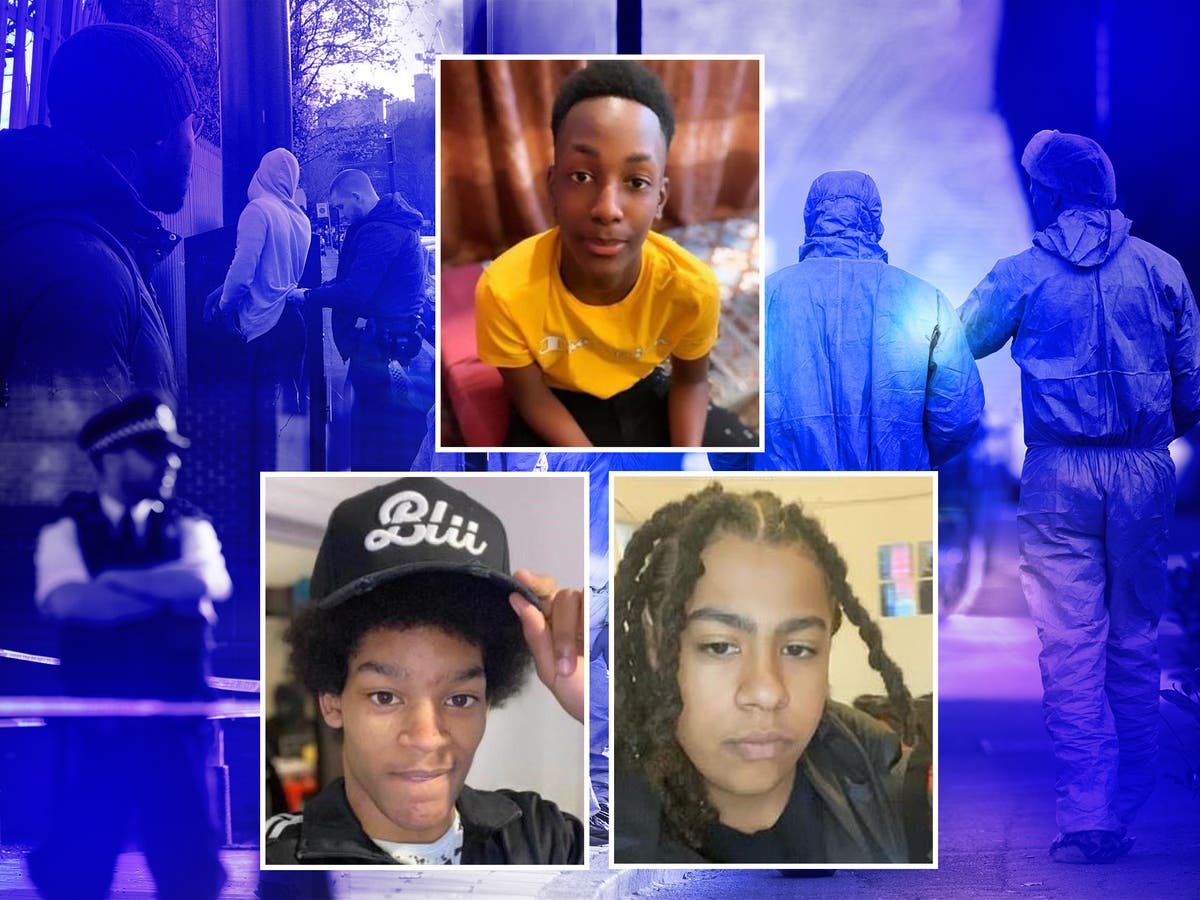
It is Wednesday afternoon and officers on the Met Police team tasked with tackling violent crime in Croydon are preparing to head out on patrol. The scale of the challenge becomes immediately clear: moments before they hit the streets, accompanied by an Independent reporter, the officers hear a 25-year-old man has been stabbed seven times in a children’s playground in broad daylight.
A recreational space where young children would usually play after school is now doubling as a scene in “London’s violence epidemic”, covered in police tape with air ambulance positioned to lift the victim to emergency care.
Our reporter on patrol with Croydon’s Violence Suppression Unit
(Metropolitan Police)
London has seen its deadliest year of teenage murder since 2008, with experts on the frontline warning that the situation will worsen without drastic change.
Knife incidents occur at least three times a week, but police insist this number would be significantly higher without their proactive efforts to tackle the issue. This includes attempts to disrupt violence between gangs based in New Addington council estates only minutes apart.
However, challenges of distrust and aggravation toward police within the community were apparent patrolling New Addington high street. Immediately noticing the unit’s unmarked police car, young people moved to vacate the area, not wanting to engage with police on any level. Or when stopping a car possibly linked to crime, the frustration and anger were palpable among the three young people – all black – indignant that they were being searched and unable to know the full reasons why.
Despite the controversy VSU officers maintained the importance of stop and search in getting weapons off the streets
(Supplied)
No drugs or weapons were recovered in the search and although the controversial tactic has been criticised by some experts, officers in the unit maintained its importance in their commitment to getting dangerous weapons off the street. Our longest siren run of the evening involved racing across the borough in search of a possible knife after a headteacher called warning that a violent ex-pupil was harassing students outside the school. By the time we arrived in the south Croydon area, almost 20 minutes away, the individual was nowhere to be seen.
Hawa Haragakizam’s 15-year-old son Tamim was stabbed to death in Woolwich, south London last summer on his way back from school. “What is the government doing? What are people doing? Are we going to normalise this monster behaviour?” Ms Haragakizam told The Independent. She added that Tamim’s friends have needed counselling since his death. Whenever she can she says she picks his friends up from school to keep them safe.
“I was so proud of him: he had ambitions, he loved his friends, he loved me. I feel like we have to do something. It’s painful to see parents going through this; people are in fear and they don’t know what to do,” Ms Haragakizam said.
Drekwon Patterson, 16 (left) and Tamim Ian Habimana, 15 (right) were stabbed to death in London this year. Their parents question what will be done to tackle violence
(Met Police)
Shaun Patterson’s 16-year-old son Drekwon was stabbed to death in Brent earlier this year in February. He said the streets are not safe for young people. “Something’s not right if so many killings can take place,” he told The Independent. “When there’s a killing I don’t see headline news, Boris doesn’t come to shut us all down and talk to us – it’s just being allowed. I’m not blaming the system but their plan is not working right now; 28 people died this year and still nothing is being done.”
Shadow policing minister Sarah Jones told The Independent that the government had “dropped the ball” on crime and youth violence for the past decade with cuts to policing, youth provision and a booming drug market all leading to the record number of teenage homicides in London.
“For many years now, since about 2018, there’s been a big push for a public health approach that looks at violence like a disease that spreads and tries to put in really effective measures policing and prevention to stop it from spreading,” the founder of the All Party-Parliamentary Group on Knife Crime and Violence Reduction said.
“What the government did in response to those calls was say that they have a public health approach in their serious violence strategy but they’ve done it in a piecemeal way,” she added.
The Croydon Central MP lamented the government’s shortsightedness in tackling key contributing factors such as school exclusions and warned that youth violence would not turn around without adequate resources for both prevention and policing.
Consultant trauma surgeon Duncan Bew, a member of the youth violence commission, echoed Ms Jones’s calls for a public health approach to youth violence.
“There’s been a tendency toward funding solutions for the consequences of violence rather than the causes of the problem and focusing on punitive measures rather than prevention,” Mr Bew said.
“There needs to be realistic expectations. There are significant unmet needs within the provision to support young people. We’re doing our very best to deal with the consequences but we need to address the root causes, otherwise you’re always firefighting.”
Jermaine Cools, 14, was the 27th teenager to be killed in London this year
(Metropolitan Police)
The chief executive of the youth violence charity Power the Fight, Ben Lindsay, warned of the dangers that undiagnosed trauma and poverty would have on young people, insisting that today’s record youth violence is a result of 15 years of cuts to youth services and policing. He added that the pandemic created a “perfect storm” for violence.
“Ask any practitioner in this field working between 2010 and now; they would have said the trajectory we’re moving in is where we’re not going to be able to control this situation because young people have not been given the support, they’ve not been given the role models, the resources these charities had is being stripped away,” Mr Lindsay said.
Commander Alex Murray, the Metropolitan Police’s lead on violent crime told The Independent that although there had been a decline in knife and gun offences in 2021, more had to be done to build trust with communities most affected by crime, also citing police cuts, social media and the growing drug market and poverty as contributing factors to violence.
“Cuts are still an issue. There’s not enough money to go round, we’ve had recessions and Covid – everyone has to make choices. Yes, it would be great to have universal youth provision everywhere but local authorities have limited money,” Mr Murray said.
He added: “Young people from black communities trust police less than average. Just where the trust needs to be greatest it’s most fragile. We need to spend time building relationships with families and charities and NGOs showing that our motivations are good.”
https://www.independent.co.uk/news/uk/home-news/london-youth-violence-teenage-homicide-b1976873.html





